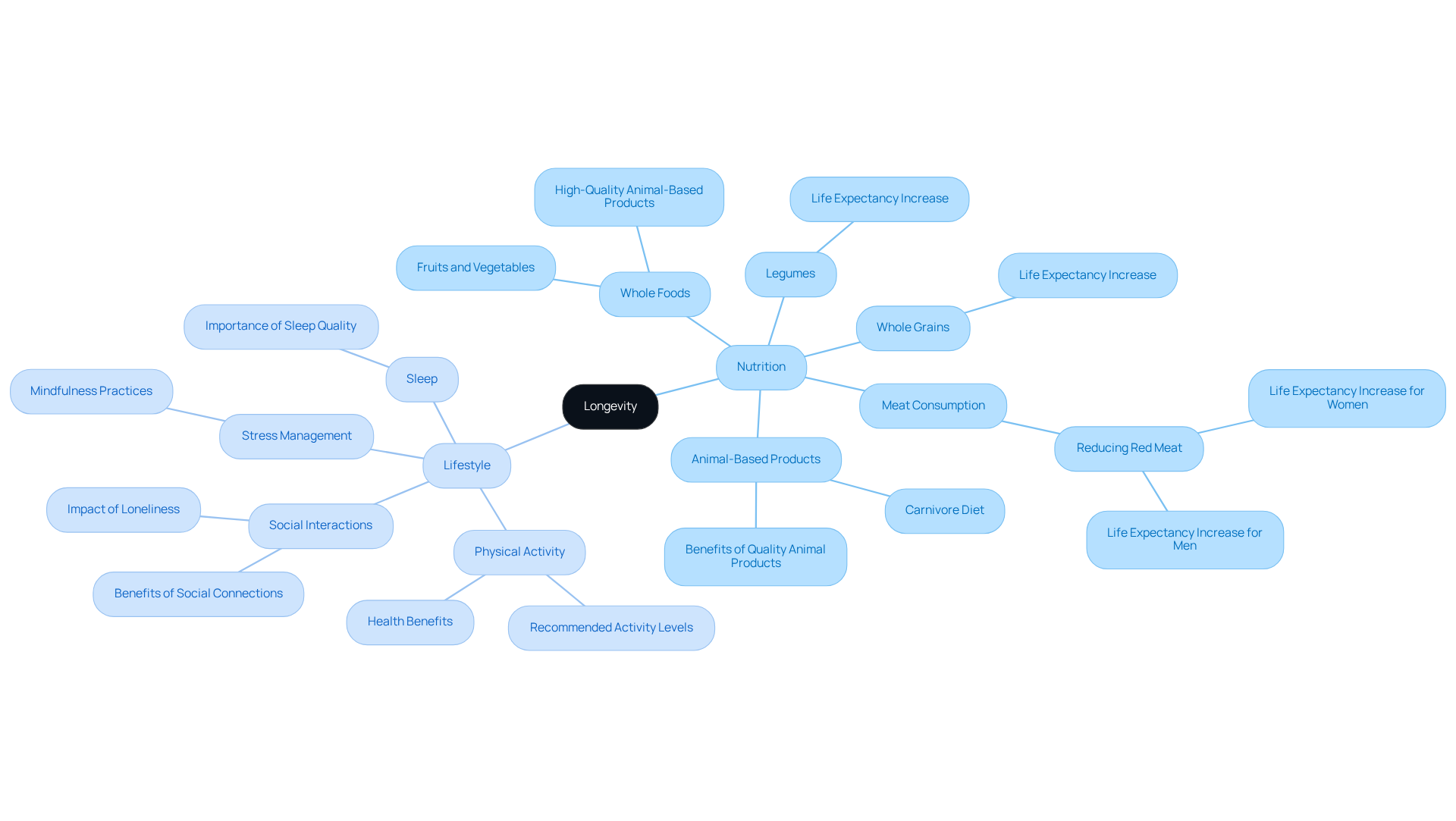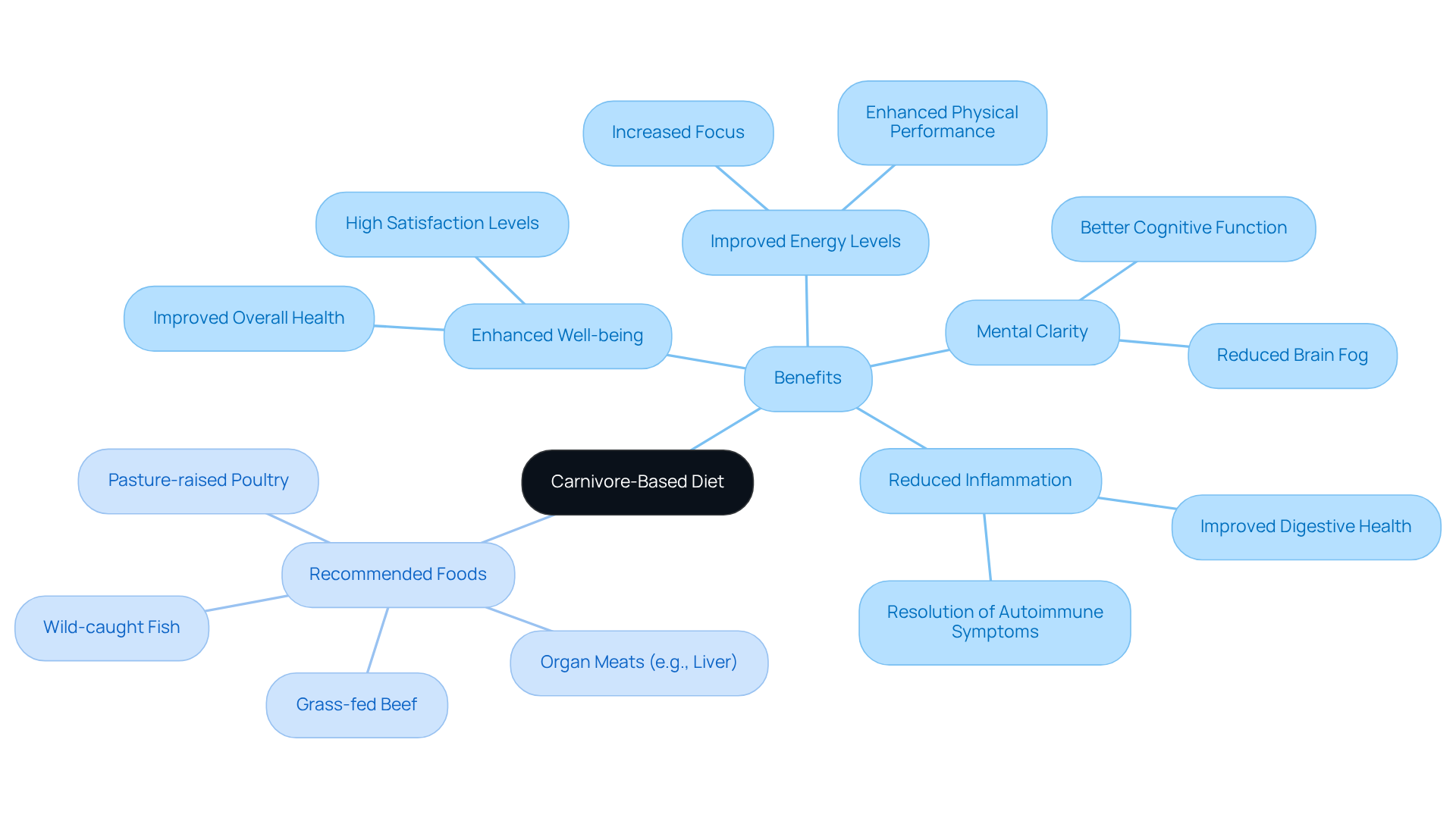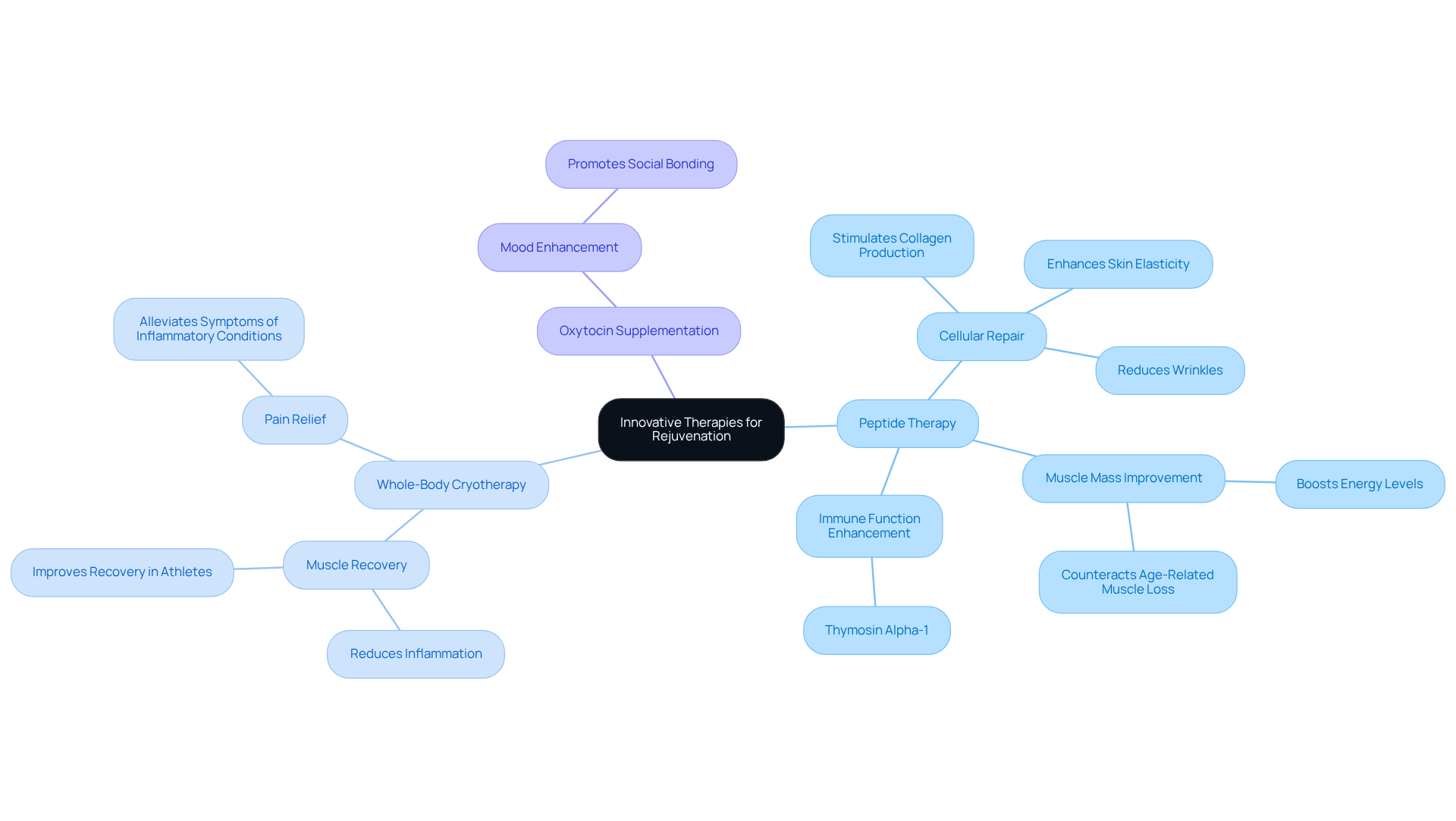3 Strategies for a Long Life Through Nutrition and Innovation
Overview
The article explores three effective strategies for achieving a long life through nutrition and innovation. It emphasizes the significance of:
- Maintaining a balanced diet
- Making informed lifestyle choices
- Embracing innovative therapies
By adopting a nutrition plan that is rich in whole foods and high-quality animal products, along with regular physical activity and advanced treatments such as peptide therapy, individuals can significantly enhance their longevity and overall well-being. This is supported by research and examples from communities renowned for their long lifespans. Furthermore, these strategies not only promote health but also foster a deeper understanding of how nutrition and innovation can transform our lives.
Introduction
The quest for longevity is as old as humanity itself, with countless cultures and communities offering insights into the secrets of a long, healthy life. Among these, the Hunza people stand out, renowned for their remarkable lifespans attributed to their unique dietary choices. This article delves into three transformative strategies that intertwine nutrition and innovative therapies. It reveals how a balanced diet—particularly one rich in high-quality animal products—and cutting-edge health treatments can pave the way for an extended, vibrant life. Yet, with so many dietary trends and wellness fads emerging, how can individuals discern the most effective path to longevity amidst the noise?
Prioritize Nutrition and Lifestyle for Longevity
To achieve a long life and good health, prioritizing nutrition and lifestyle is essential. Research indicates that a balanced nutrition plan, especially one abundant in whole foods such as fruits, vegetables, and high-quality animal-based products, can greatly lower the risk of chronic diseases.
The Hunza community, celebrated for their long life, illustrates the advantages of a nutrition plan that incorporates high-quality animal-based products, frequently reaching the milestone of their hundredth birthdays. For instance, transitioning from a standard Western eating pattern to an ideal nutritional regimen starting at age 20 could enhance life expectancy by over a decade, with women benefiting by 10.7 years and men by 13.0 years. Including legumes, whole grains, and nuts in daily diets has been associated with improved lifespan, while lowering red and processed meat consumption can further boost well-being. Research suggests that decreasing red meat consumption would raise life expectancy for women by 1.6 years and for men by 1.9 years. However, it is important to acknowledge that quality animal-based food can also play a crucial role in a healthy eating pattern, as observed in the Hunza lifestyle. Personally, I have embraced a carnivore diet, which has aided my personal well-being and life journey.
Lifestyle factors also play a crucial role in longevity. Regular physical activity, recommended at 150-300 minutes per week, is associated with lower risks of heart disease, diabetes, and cognitive decline. Adequate sleep and effective stress management are equally important, as they contribute to overall well-being. Participating in social interactions and mindfulness practices can improve mental and emotional well-being. Research indicates that ongoing loneliness increases the risk of early death by 57%. By prioritizing these selections, individuals can create a strong basis for long life, supported by evidence highlighting the significance of balanced nutrition and active lifestyles. Additionally, exploring innovative therapies such as mindfulness and stress reduction techniques can further improve one’s approach to healthy aging.

Adopt a Carnivore-Based Diet for Optimal Health
Adopting a carnivore-focused eating plan can significantly enhance well-being and contribute to a long life. This nutritional strategy emphasizes animal products, which are abundant in essential nutrients such as high-quality protein, omega-3 fatty acids, and vital vitamins like B12 and D, and is believed to promote long life. Studies indicate that individuals adhering to a carnivorous eating plan frequently experience notable improvements in energy levels, mental clarity, and overall health. For instance, the removal of processed foods and carbohydrates is linked to reduced inflammation and enhanced metabolic function.
To fully harness the benefits of this diet, it is essential to choose high-quality meat sources, including:
- Grass-fed beef
- Wild-caught fish
- Pasture-raised poultry
Furthermore, incorporating organ meats, such as liver, can further elevate nutrient intake. As with any substantial dietary change, consulting with a healthcare professional is advisable to ensure that all nutritional needs are adequately met. Are you ready to explore the potential of a carnivore diet for your health?

Incorporate Innovative Therapies for Rejuvenation
Integrating cutting-edge treatments can greatly enhance revitalization and overall well-being. Peptide therapy, which utilizes naturally occurring amino acids, has garnered attention for its potential anti-aging benefits, particularly in promoting cellular repair and regeneration. Research indicates that peptides can stimulate collagen production, enhance skin elasticity, and reduce wrinkles, making them a valuable addition to anti-aging strategies.
Furthermore, whole-body cryotherapy (WBC) has been shown to improve recovery and reduce inflammation. Studies report positive effects on muscle soreness and overall recovery in athletes. For instance, a study involving physically active subjects demonstrated that WBC improved acute recovery during high-intensity exercise, highlighting its effectiveness in rejuvenation.
In addition, oxytocin supplementation has been associated with enhanced mood and social bonding, further promoting mental well-being. Individuals interested in these therapies should seek reputable providers and ensure quality assurance in sourcing peptides from reliable manufacturers for purity and efficacy.
By combining these innovative approaches with a solid nutritional foundation, remarkable improvements in health and long life can be achieved. Are you ready to explore these transformative therapies further?

Conclusion
Prioritizing nutrition and innovative lifestyle choices is fundamental for achieving longevity and optimal health. A well-balanced diet rich in whole foods, particularly those high in quality animal-based products, has been shown to significantly reduce the risk of chronic diseases and enhance life expectancy. The insights drawn from communities like the Hunza highlight the profound impact that dietary choices can have, illustrating that simple shifts in eating habits can lead to remarkable improvements in lifespan.
The article emphasizes three key strategies:
- Adopting a nutritious diet, particularly a carnivore-focused plan
- Engaging in regular physical activity
- Exploring innovative therapies
Each of these components plays a critical role in fostering a healthier, longer life. From the benefits of high-quality animal products to the rejuvenating effects of therapies like peptide treatments and cryotherapy, the evidence supports a multi-faceted approach to health that combines traditional wisdom with modern advancements.
Ultimately, the journey toward a longer, healthier life is not solely about dietary changes but also about embracing a holistic lifestyle that includes physical activity, social connections, and innovative health practices. By integrating these strategies, individuals can not only enhance their well-being but also actively participate in shaping a future where longevity is attainable for all. Embracing these insights can lead to transformative changes, paving the way for a vibrant, extended life.
Frequently Asked Questions
Why is nutrition important for longevity?
Nutrition is essential for longevity as a balanced nutrition plan, particularly one rich in whole foods like fruits, vegetables, and high-quality animal-based products, can significantly reduce the risk of chronic diseases.
What does the Hunza community illustrate about nutrition and longevity?
The Hunza community is known for their long life, demonstrating the benefits of a nutrition plan that includes high-quality animal-based products, with many individuals reaching their hundredth birthdays.
How can changing eating patterns affect life expectancy?
Transitioning from a standard Western diet to a healthier nutritional regimen starting at age 20 could increase life expectancy by over a decade, with women gaining an average of 10.7 years and men 13.0 years.
What dietary components are associated with improved lifespan?
Including legumes, whole grains, and nuts in daily diets is linked to improved lifespan, while reducing red and processed meat consumption can further enhance well-being.
What is the impact of decreasing red meat consumption on life expectancy?
Reducing red meat consumption could increase life expectancy by 1.6 years for women and 1.9 years for men.
What role does quality animal-based food play in a healthy diet?
Quality animal-based food is crucial in a healthy eating pattern, as seen in the Hunza lifestyle, which contributes to their longevity.
How does lifestyle impact longevity?
Lifestyle factors such as regular physical activity, adequate sleep, and effective stress management are vital for longevity, helping to lower the risks of heart disease, diabetes, and cognitive decline.
What is the recommended amount of physical activity for promoting longevity?
It is recommended to engage in 150-300 minutes of physical activity per week to support lower risks of chronic diseases.
How does social interaction relate to longevity?
Participating in social interactions can enhance mental and emotional well-being, while ongoing loneliness increases the risk of early death by 57%.
What innovative therapies can support healthy aging?
Innovative therapies such as mindfulness and stress reduction techniques can improve one’s approach to healthy aging and overall well-being.






